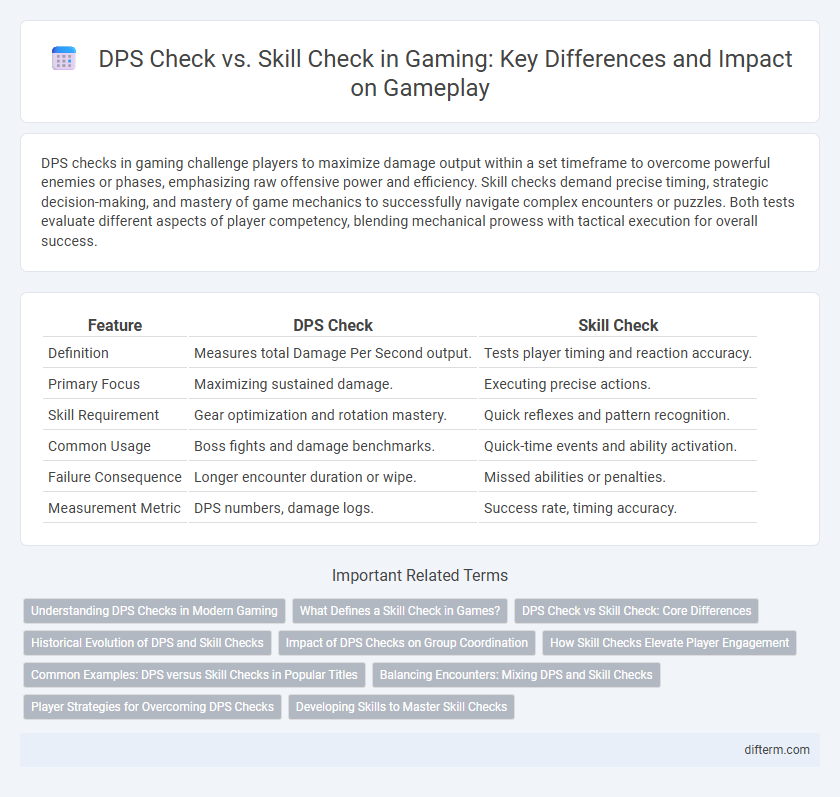DPS checks in gaming challenge players to maximize damage output within a set timeframe to overcome powerful enemies or phases, emphasizing raw offensive power and efficiency. Skill checks demand precise timing, strategic decision-making, and mastery of game mechanics to successfully navigate complex encounters or puzzles. Both tests evaluate different aspects of player competency, blending mechanical prowess with tactical execution for overall success.
Table of Comparison
| Feature | DPS Check | Skill Check |
|---|---|---|
| Definition | Measures total Damage Per Second output. | Tests player timing and reaction accuracy. |
| Primary Focus | Maximizing sustained damage. | Executing precise actions. |
| Skill Requirement | Gear optimization and rotation mastery. | Quick reflexes and pattern recognition. |
| Common Usage | Boss fights and damage benchmarks. | Quick-time events and ability activation. |
| Failure Consequence | Longer encounter duration or wipe. | Missed abilities or penalties. |
| Measurement Metric | DPS numbers, damage logs. | Success rate, timing accuracy. |
Understanding DPS Checks in Modern Gaming
DPS checks in modern gaming require players to optimize damage output within specific timeframes to overcome challenging encounters, emphasizing precise rotation and resource management. Unlike skill checks that assess mechanical ability or reaction time, DPS checks prioritize strategic planning and character build optimization. Mastering DPS checks is crucial for competitive raid progression and high-level PvE content.
What Defines a Skill Check in Games?
A skill check in gaming measures a player's precision and timing rather than raw power, requiring quick reactions or strategic input to succeed. Unlike a DPS check, which evaluates sustained damage output against a target, skill checks often determine success through specific actions like button presses, aim accuracy, or puzzle-solving under pressure. These mechanics test player competence and adaptability, directly impacting progression and challenge within gameplay scenarios.
DPS Check vs Skill Check: Core Differences
DPS Check measures a player's ability to maximize damage output within a set time, emphasizing precision, timing, and effective use of abilities or equipment. Skill Check evaluates overall player proficiency in reaction time, strategy, and adaptability during specific in-game challenges or mechanics. Core differences lie in DPS Check focusing on sustained damage efficiency, whereas Skill Check assesses versatile gameplay and decision-making under pressure.
Historical Evolution of DPS and Skill Checks
DPS checks originated in early MMORPGs as quantifiable measures of a player's damage output over a set period, evolving alongside raid mechanics to enforce optimized team compositions and prioritization. Skill checks have roots in tabletop RPGs and were adapted into video games to assess player timing, precision, and decision-making, becoming integral to boss encounters and puzzle-solving over time. Both mechanics have progressively shaped gameplay strategies, with DPS checks emphasizing performance metrics and skill checks highlighting player mastery and reflexes.
Impact of DPS Checks on Group Coordination
DPS checks in gaming require players to maintain high damage output within a limited timeframe, directly impacting group coordination by enforcing strict role responsibilities and timing synchronization. Failure to meet DPS thresholds often results in group-wide setbacks, emphasizing the need for optimized communication and strategic resource management. Skill checks, while important for individual performance, do not impose the same immediate pressure on collective group timing and damage pacing.
How Skill Checks Elevate Player Engagement
Skill checks challenge players to react quickly and accurately, enhancing immersion and maintaining intense focus during gameplay. Unlike DPS checks that primarily measure damage output, skill checks reward precision, timing, and adaptability, fostering a deeper connection between player actions and game outcomes. This dynamic interaction elevates player engagement by transforming routine tasks into interactive, skill-based experiences that demand continuous attention and growth.
Common Examples: DPS versus Skill Checks in Popular Titles
In gaming, DPS checks emphasize maximizing damage output within a limited time, commonly seen in titles like World of Warcraft raid encounters and Destiny 2 boss fights where players must sustain high damage to succeed. Skill checks prioritize precision and timing, frequently featured in games such as Dark Souls and Sekiro, where mastering attack patterns and parrying are crucial for progression. Popular games often combine both mechanics, challenging players to balance raw damage with refined skill execution for optimal performance.
Balancing Encounters: Mixing DPS and Skill Checks
Balancing encounters in gaming requires a strategic mix of DPS checks and skill checks to maintain player engagement and challenge. DPS checks focus on damage output, testing a player's ability to optimize their character's offensive capabilities, while skill checks evaluate problem-solving, timing, and precision. Integrating both ensures dynamic gameplay, rewarding diverse playstyles and fostering teamwork during raids or boss fights.
Player Strategies for Overcoming DPS Checks
Players facing DPS checks prioritize optimizing damage output through precise ability rotations and gear enhancements to meet strict encounter thresholds. Effective strategies involve managing cooldowns efficiently, leveraging class synergies, and adapting positioning to maximize sustained damage. Continuous performance analysis and real-time adjustments ensure players overcome DPS checks to progress in challenging raid and dungeon content.
Developing Skills to Master Skill Checks
Mastering skill checks in gaming requires focused practice on precision, timing, and pattern recognition, which are crucial for overcoming challenging scenarios. Unlike DPS checks that prioritize raw damage output, skill checks demand players develop cognitive and motor skills to execute complex mechanics flawlessly under pressure. Continuous training in these areas enhances overall gameplay performance and adaptability in competitive environments.
DPS Check vs Skill Check Infographic

 difterm.com
difterm.com